广东省深圳市Module 1 Unit 1 Helping those in need Reading 课件 (2)
文档属性
| 名称 | 广东省深圳市Module 1 Unit 1 Helping those in need Reading 课件 (2) | 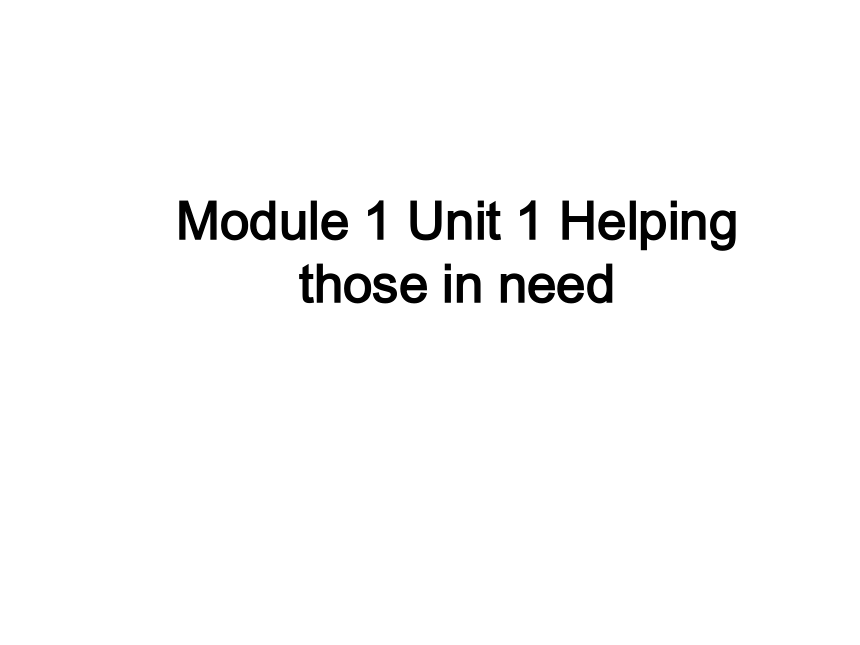 | |
| 格式 | zip | ||
| 文件大小 | 3.9MB | ||
| 资源类型 | 教案 | ||
| 版本资源 | 牛津深圳版 | ||
| 科目 | 英语 | ||
| 更新时间 | 2017-07-26 00:00:00 | ||
图片预览

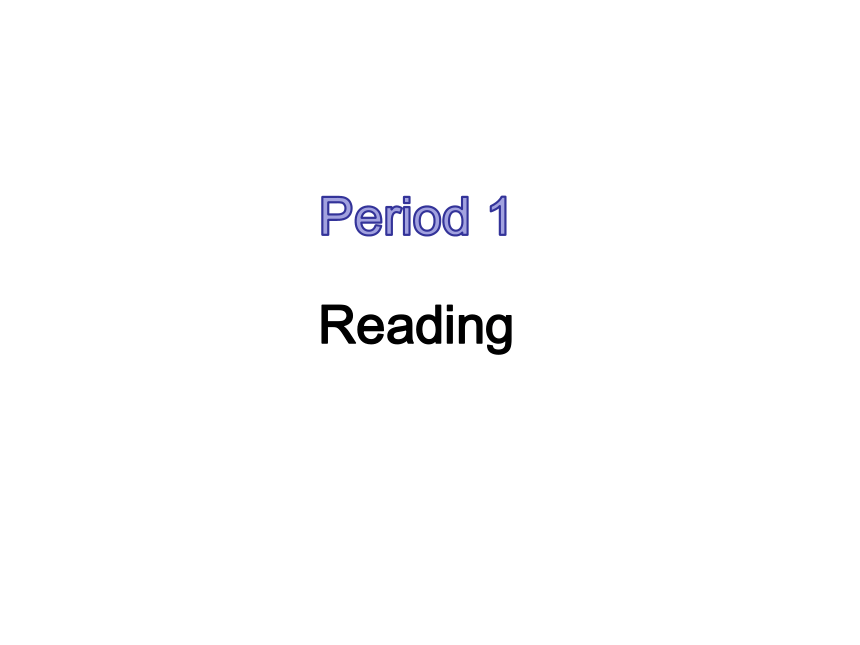
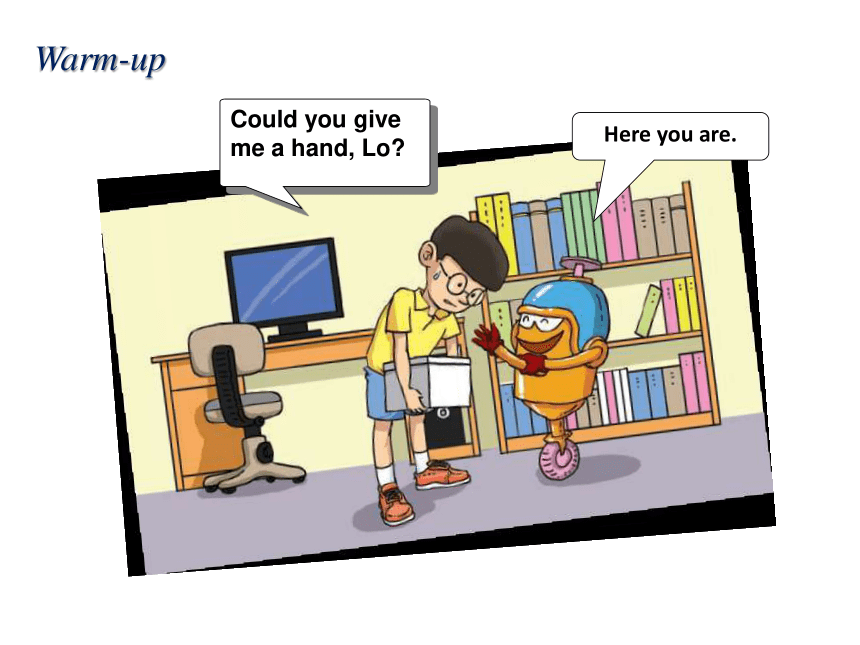
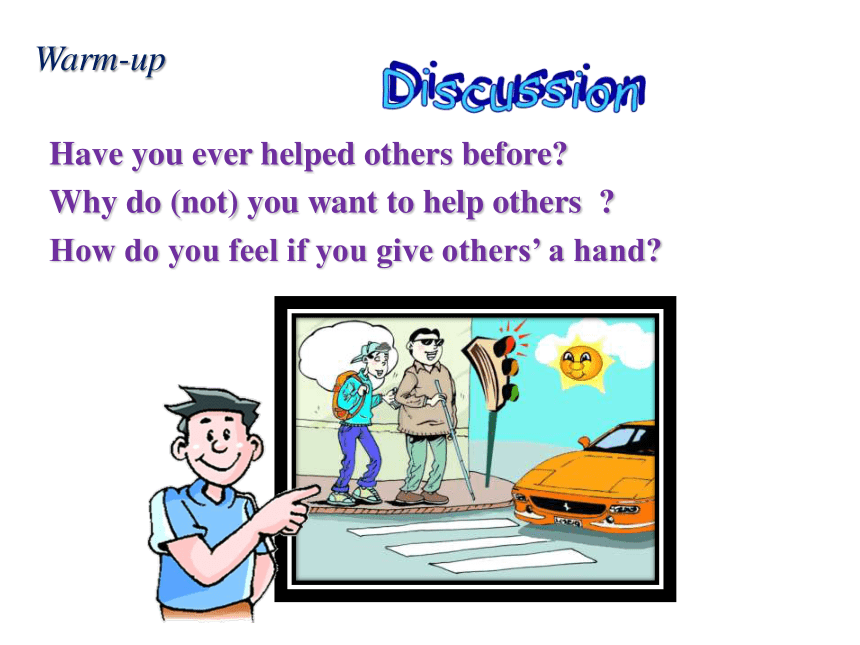
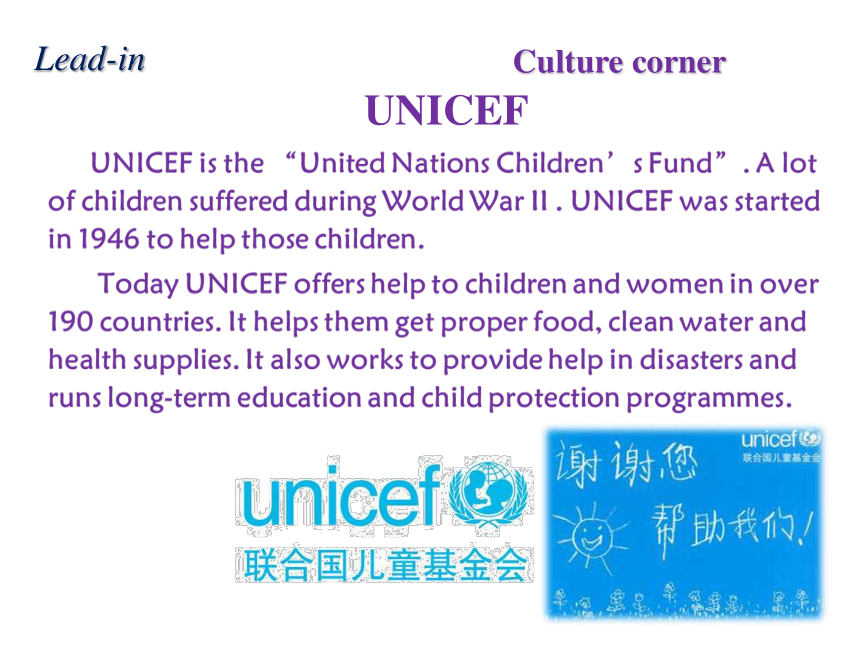
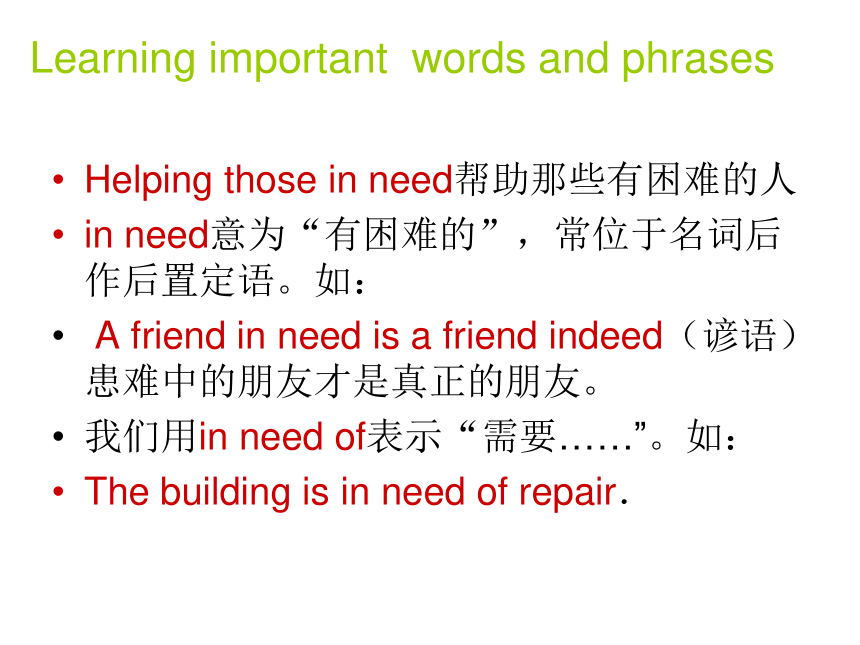
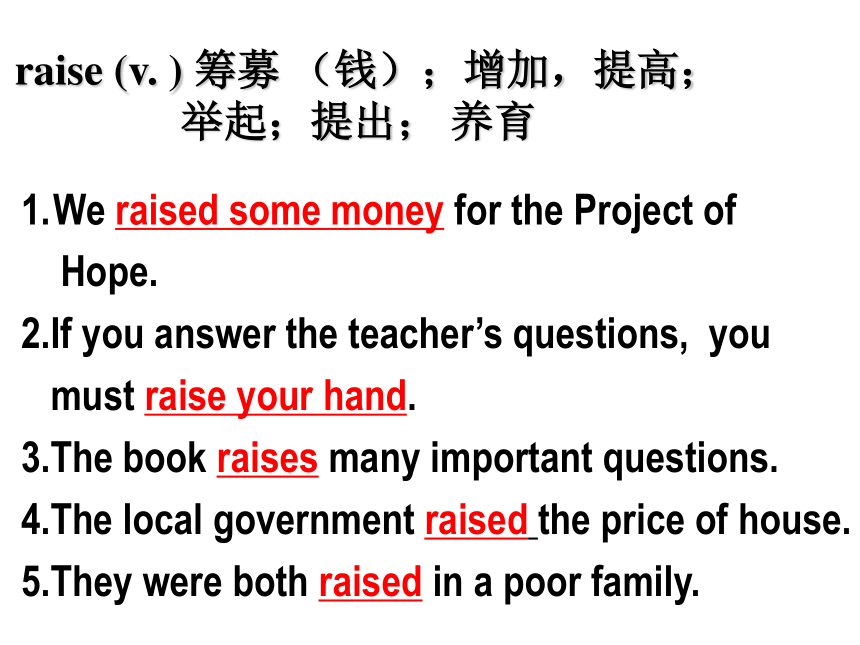
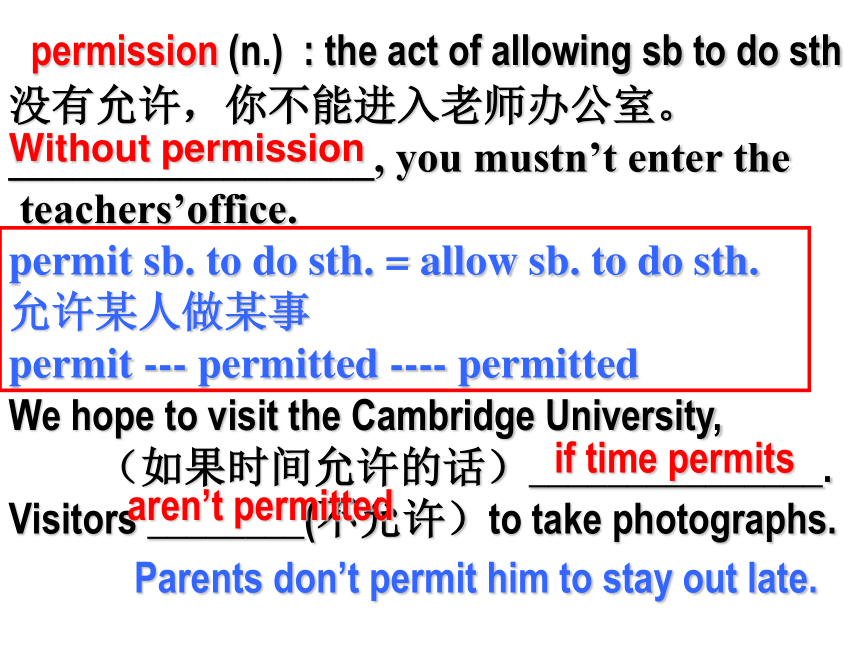
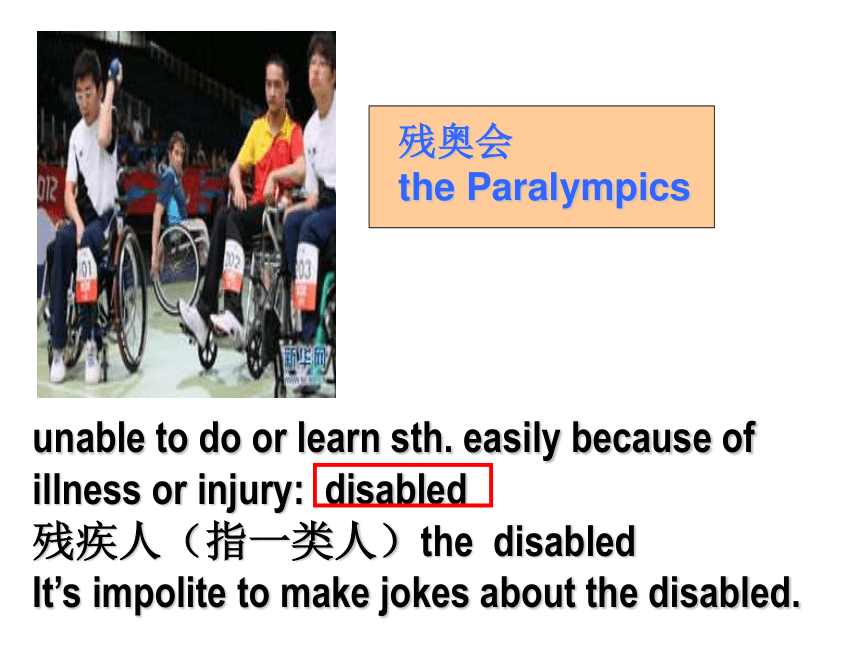
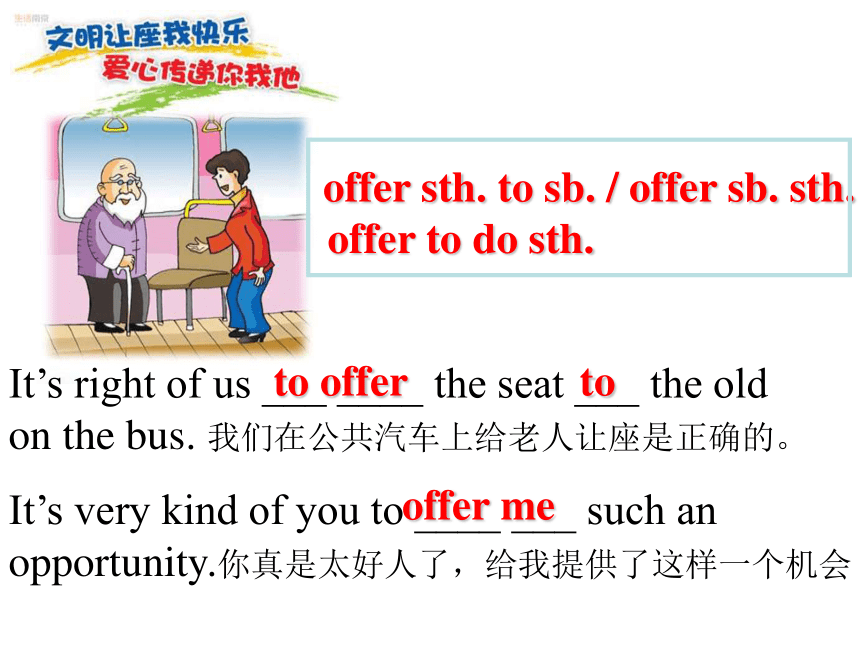
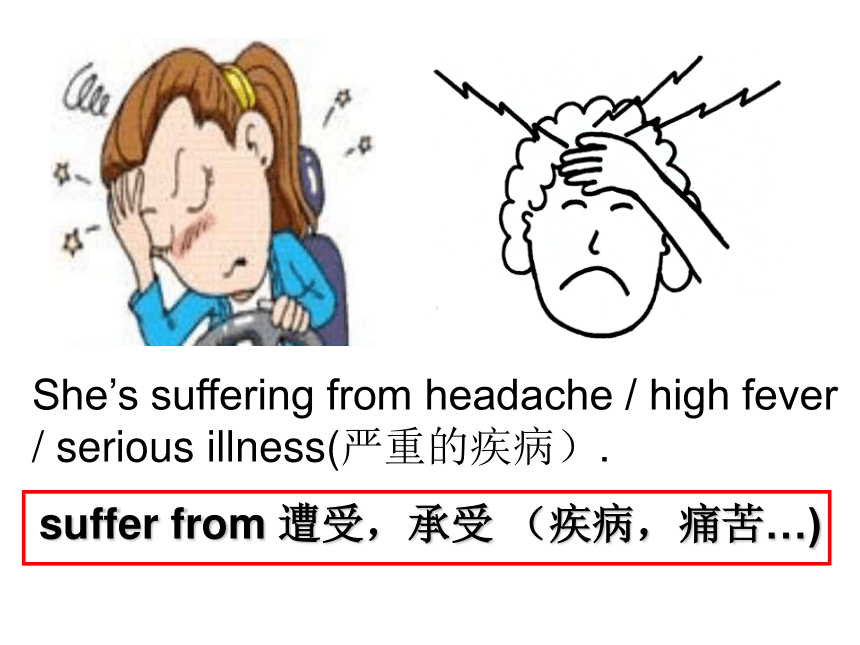
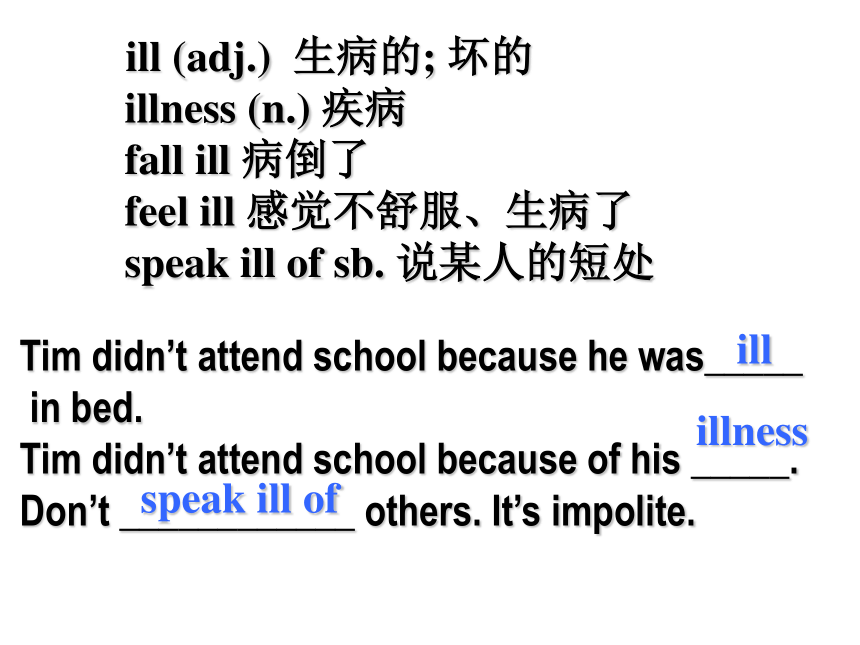
文档简介
课件64张PPT。Module 1 Unit 1 Helping those in needPeriod 1 ReadingWarm-upHere you are.Could you give me a hand, Lo?Warm-upHave you ever helped others before?
Why do (not) you want to help others ?
How do you feel if you give others’ a hand?
Lead-inCulture corner?UNICEF Learning important words and phrases Helping those in need帮助那些有困难的人
in need意为“有困难的”,常位于名词后作后置定语。如:
A friend in need is a friend indeed(谚语)患难中的朋友才是真正的朋友。
我们用in need of表示“需要……”。如:
The building is in need of repair. raise (v. ) 筹募 (钱);增加,提高;
举起;提出; 养育We raised some money for the Project of
Hope.
2.If you answer the teacher’s questions, you
must raise your hand.
3.The book raises many important questions.
4.The local government raised the price of house.
5.They were both raised in a poor family.permission (n.) : the act of allowing sb to do sth没有允许,你不能进入老师办公室。
_________________, you mustn’t enter the
teachers’office.
permit sb. to do sth. = allow sb. to do sth.
允许某人做某事
permit --- permitted ---- permitted
We hope to visit the Cambridge University,
(如果时间允许的话)_______________.
Visitors ________(不允许)to take photographs.
Without permissionif time permitsaren’t permittedParents don’t permit him to stay out late.unable to do or learn sth. easily because of
illness or injury: disabled
残疾人(指一类人)the disabled
It’s impolite to make jokes about the disabled.残奥会
the Paralympics offer sth. to sb. / offer sb. sth.
offer to do sth.It’s right of us ___ ____ the seat ___ the old
on the bus. 我们在公共汽车上给老人让座是正确的。It’s very kind of you to ____ ___ such an
opportunity.你真是太好人了,给我提供了这样一个机会 to offer to offer mesuffer from 遭受,承受 (疾病,痛苦…)She’s suffering from headache / high fever
/ serious illness(严重的疾病). ill (adj.) 生病的; 坏的
illness (n.) 疾病
fall ill 病倒了
feel ill 感觉不舒服、生病了
speak ill of sb. 说某人的短处Tim didn’t attend school because he was_____
in bed.
Tim didn’t attend school because of his _____.
Don’t ____________ others. It’s impolite.illspeak ill of illness organize (v.) 组织; 策划
organizer (n.) 组织者
organization (n.) 组织The English speaking competition was well ________.
The aim of this ________is to help the people in need.
Tom is one of the _________ in this activity.organizedorganizationorganizersserious (adj.) 严重的,严肃的
seriously (adv.)严重地= badlyBelieve me, I'm extremely____________ .
相信我,我绝对是认真的。
His legs were ______ hurt, so he couldn’t walk
any further.
Unhealthy lifestyles will lead to ______illness.seriousseriouslyserious joy (n.) = happiness / pleasure
高兴,喜悦,快乐
joyful (adj.)
joyfully (adv.)
to one’s joy 使某人高兴的是….
Looking after the baby is both painful and
____.
They greeted him _______.
We should study with ________.
joyfuljoyfullyjoy volunteer (n.) 志愿者
voluntary (adj.) 自愿的,自发的;无偿的
Schools need __________ to help children
to read.
学校需要义务工作者帮助儿童阅读。
In her spare time she does _________work.
她在业余时间做义工。volunteersvoluntaryPresentationReading A. What do you know about …?There are many kinds of voluntary work. Can you match the activities with the pictures below? Write the correct letters in the boxes.a helping disabled people
b helping raise money
c visiting an old people’s home
d visiting sick children in a hospital a b c dPresentation 1 2 3 4PresentationLook at the pictures, the writers’ names and the first sentence of each report on page3. Write the correct names in the blanks.B. Before you readAnnie Betty MarkPresentation1. I talked to children without parents. ________
2. I helped sick children. ________
3. I taught disabled children to sing. ________
MarkAnnieBettyPresentation--writingVoluntary workThree teenagers offered to do some voluntary work during the school holidays. They wrote the following report.PresentationI did some voluntary work in a children’s hospital. The children there all suffer from serious illnesses. We organized a painting competition for them.
I met a girl called Cindy. She wanted to paint a picture of the park near her home. I went there and took some photos of it. Cindy used them for her painting.
BettyPresentationThere are many children without parents. I met some of these children with my mother. We taught them to tell stories. This helps them express their feelings. One child said, “My friends don’t understand my pain.”
We spent time with a girl called Vivien. Her parents died in a car accident, and she is unhappy and very lonely. She needs friendship. My mother and I will continue to visit Vivien.
MarkPresentationI wanted to help disabled children. They have difficulty walking or moving. I taught them to sing because music can bring them joy and peace.
I met a boy called Tim. He hurt his legs in an accident, but he has lots of courage. We need to help children like Tim and raise their spirits. I will continue to do voluntary work in the future.
AnniePresentationC. Vocabulary1. When something is serious, it is _______.
a. bad or dangerous b. good and safe
2. If you have an illness, you are a person_______.
a. in good health b. in bad health
3. If you have peace, you are ______.
a. nervous b. not worried or excitedC1.The words in italics are from the reports on page 3. Circle the correct answers to complete these sentences.abbPresentation4. A person with courage is usually ____ of something dangerous or difficult.
a. afraid b. not afraid
5. If you raise something, you _____.
a. make it lower b. move it higher
6. If you are in high spirits, you have a good ____.
a. feeling b. ability
bbaPresentationdifficulty express lonely offer voluntary work C2.Complete the passage below with the words from the box . Change their forms if necessary. Joe wanted to do (1)_______________ during the summer holidays, so he (2)________ to help at a local hospital. Every Saturday, he went there to look after the patients. One of them had (3)_________ walking, so he helped him move around. Another one could not see. voluntary work offereddifficultyPresentationJoe read news and funny stories to her so that she did not feel (4)_______. Joe also talked with the patients. This helped them (5)_______ their feelings. Joe enjoyed helping people. He will continue to help at the hospital in his free time.lonelyexpressPresentation They need help !
Can you help these children?
Cindy, aged 12
Cindy is in hospital because she (1)_________________
_______. Cindy wants to (2)______________ the park near her home. We need someone to go to the park and (3)___________________ for Cindy.D1. Read the reports on page 3 and complete the notice below. D. Comprehensionsuffers from seriouspaint a picture oftake some pictures of itillnessesPresentationVivien, aged 13
Vivien’s parents died in (4)_______________. She is
(5)________________________. We need someone to talk to her and make friends with her.
Tim, aged 14
Tim was a healthy boy. He used to love sport until he (6)________________________. We need some volunteers to teach disabled children like Tim to (7)______ and to help them (8)_________________.
unhappy and very lonelya car accidenthurt his legs in an accidentsingraise their spiritsD2. How would you help the children in D1? Discuss this with your classmates.Period 2 Listening&SpeakingPresentationPre-listeningHave you ever take part in any money-raising activities? How?Brainstorming listeningPresentationBefore listening, go through the listening material and guess what you are going to listen to.
First listening, catch the main idea of the listening material.
Second listening, try to write down the word and figure very quickly, then check.
Listening SkillsPresentationListen to a radio programme about different types of money-raising activities. Then complete the table below.Money-raising activitiesDance
competition2,000buy new
booksbook fairtheir old books
and CDs1,500 buy food and
clothesPresentationMoney-raising activitiesListen to a radio programme about different types of money-raising activities. Then complete the table below.PresentationTalking about plansA Talk timeSpeaking PresentationIn pairs, make conversations like the example
below. Change roles and do it again when you
have finished.
S1: What are you going to do on Saturday?
S2: (sure) I’m going to do some voluntary work.
(not sure) I’m thinking about doing some voluntary work.
S1: Sunday? S2: (not sure) visit children in hospital
S1: next Saturday? S2: (not sure) visit my grandparents.
S1: this evening? S2: (sure)_________________________________ PresentationB Speak upWhich voluntary activity are you going to take part in? In groups of four, take turns to interview each other. Use the ideas below or your own ideas. Follow the example.help old people in the community
raise money for children in need
Visit sick children in hospitalPresentationS1: Which voluntary activity are you going to take part in?
S2: I’m going to visit disabled children in hospital.
S3: Why?
S2: Because I want to help them.
S4: How are you going to help them?
S2: I’m planning to teach them to sing.Period 3 Grammar(1)基本形式:
to+动词原形 (在某些情况下可以不带 to)Grammar动词不定式A、作主语 To learn a foreign language is not easy . It is good others.
帮助他人是件好事。 It is exciting the Internet.
上网是件令人兴奋的事。 to help
to surf= It’s not easy to learn a foreign language.动词不定式用法B、作表语The important thing is to finish the work
on time .
What you have to do now is
(打扫教室) to clean the classroom 动词不定式C 作宾语 动词 + to do
常见动词有 choose , hope , offer , want , decide,
learn , plan, wish, agree, fail等1. He decided (buy) the camera.to buy 2. I want (listen to) some music after class.to listen to 3. I hope (travel) all over the world one day.to travel动词不定式2) 动词+疑问词 + to doI don’t know what to do .
how to do it / that.
(去哪里)
(什么时候出发)
(选择哪个)Where to go When to leave Which one to choose动词不定式3) 动词 + it(形式宾语)+宾补 +to do
I find it important to learn English我发现很难和他好好相处.
我发现在炎热的夏天很容易入睡I find it hard to get on well with him .I find it easy to fall asleep in hot summer.动词不定式1) 动词 + 宾语 +to do
Li Mei asked me to show her the new dictionary .
注:有以上结构的常用动词有 tell. wish, ask, want
like, beg, invite,warn, allow,encourage,advise 等。
2) 动词 + 宾语 + do
(不带 to 的不定式)
注:常用的动词是:感官动词see, hear, feel,
watch, notice; 使役动词 have ,make, let.
动词不定式做宾补E、作状语可以表目的、表结果、表原因F、作定语(必须后置)I came here
( 告诉你一个好消息)to tell you a good newsWe have a lot of homework to do every day.I have a good news to tell you.我们每天有很多作业要做.我有个好消息要告诉你.动词不定式not + to doMr.Smith asked the boy ___________(not play) this kind of game. not to playPlease tell her __________(not do) so much housework. not to do动词不定式的否定形式PresentationInfinitivesWe often use to + infinitive after these verbs:choose hope offer want decide learn plan wish
Things to remember We can use question words + to + infinitives after decide,
know, learn and remember.
Do you know how to help disabled children?Presentation A1 Mark and his mother visited Vivien. Mark is telling his friends about the visit. Complete his words with the correct forms of the verbs in brackets.We (1) ________________(decide/ meet) Vivien today. We (2)_____________(want/help) her in some way. When we arrived, Vivien was very happy. She(3)_____________(begin/talk) to me about her school. She said, “I (4)__________(like/ go) to school, but I don’t have any friends. I feel lonely.”
Mum gave her some advice. Then Mum asked me to give Vivien her present, but I (5)_____________(forget/bring) it! Vivien said, “It’s OK. I (6)___________ (hope/see) you again soon.”decided to meetwanted to helpbegan to talklike to goforgot to bringhope to seePresentationB.Betty is visiting Cindy in the hospital. Complete their conversation with the correct forms of the verbs in brackets.Betty: Morning, Cindy. We’re organizing a painting competition for the children in hospital. We’ll (1)_____ them ________(ask/paint) pictures. Would you like to take part in the competition?
Cindy: Yes, I’d love to. I want to paint a picture of the park near my home, but the doctor won’t (2)___ me ___(let/go) out. He (3)____ me _______(want/stay) in hospital.askletgowantsto stayto paintPresentationBetty: Do you (4)_______ me ________(want/take) some photos of that park for you?
Cindy: Yes. That would be very kind of you.
Betty: I’ll go there this weekend. Then I’ll bring the photos to you next week and (5)___________ you ___________(teach/paint).
Cindy: Thanks for your help.teachto paintwantto takePresentation C.Use the information in the reports on page 3 to answer these questions. Use the correct infinitives in your answers.Why did the three teenagers offer to do some
voluntary work during the school holidays?
They offered to do some voluntary work _______
children in need.
Why did Betty go to the children’s hospital?
She went to the hospital ___________ a painting competition for the children there.
Why did Betty go to the park near Cindy’s home?
She went there ________ some photos.to helpto taketo organizePresentation4 Why did Mark and his mother teach Vivien to tell stories?
They taught Vivien to tell stories ___________ her express her feelings.
Why did Annie teach disabled children to sing?
She taught them to sing ___________ them joy and peace.to helpto bringPractice用所给单词的适当形式填空。
1.Our teachers always make us _______(study).
2.She would like you _________(come)?to her home.
3. They want ________(go)shopping.
4. The policeman asked us ______________(not play) in the street.
5.She plans_________(visit)?her aunt.studyto cometo gonot to playto visitPractice?????填空。
1. I am ________(plan)_________(help) the poor children.
2. I am thinking about _______(play) football with my friends.to helpplanningplayingPeriod 4 WritingPresentationYou and your classmates are planning a money-raising activity to help children in need. You need to write a letter to your head teacher to ask permission. A letter to the head teacherWriting PresentationA. In groups, brainstorm some money-raising ideas. Follow the example.Money-raising ideasFood fair Idea: students and teachers sell food they have made themselvesBook fair Idea: students sell old booksPresentationWhy are you writing the letter?
_____________________________________________
How are you going to raise money?
_____________________________________________
When and where would you like to have the activity?
_____________________________________________
What would you like the head teacher to do?
_____________________________________________B. Discuss how you will write your letter. Write down some notes below.Because we need to raise money for children in need.We are going to sell books/sell food/…We would like to have the activity at … on …We hope he can help us do some promotion … PresentationC. Write the letter to your head teacher. Use the outline below and your notes in B to help you.DateYour head teacher’s name and school addressGreetingWhy you are writing the letterHow are you going to raise moneyMr/MsDear Mr/MsWe are writing to In order to raise money for children in need, we are going to
FeburaryNo. 399, Tianyuan Road,
Tianhe District, GZask you for a permission
hold a book fair
PresentationWhen and where you would like to have the activityWe would like to have the activity at
our playground on Friday morningWhat you would like the head teacher to doClosingYour names and classCould you please give us permission to Yours sincerely,Class? support us to hold
the activity
We hope we can borrow the
playground for two days.13Homework1.Do the exercise of Unit 1.
2.We can also use verbs + objects + to + infinitives to make up some sentences.
Why do (not) you want to help others ?
How do you feel if you give others’ a hand?
Lead-inCulture corner?UNICEF Learning important words and phrases Helping those in need帮助那些有困难的人
in need意为“有困难的”,常位于名词后作后置定语。如:
A friend in need is a friend indeed(谚语)患难中的朋友才是真正的朋友。
我们用in need of表示“需要……”。如:
The building is in need of repair. raise (v. ) 筹募 (钱);增加,提高;
举起;提出; 养育We raised some money for the Project of
Hope.
2.If you answer the teacher’s questions, you
must raise your hand.
3.The book raises many important questions.
4.The local government raised the price of house.
5.They were both raised in a poor family.permission (n.) : the act of allowing sb to do sth没有允许,你不能进入老师办公室。
_________________, you mustn’t enter the
teachers’office.
permit sb. to do sth. = allow sb. to do sth.
允许某人做某事
permit --- permitted ---- permitted
We hope to visit the Cambridge University,
(如果时间允许的话)_______________.
Visitors ________(不允许)to take photographs.
Without permissionif time permitsaren’t permittedParents don’t permit him to stay out late.unable to do or learn sth. easily because of
illness or injury: disabled
残疾人(指一类人)the disabled
It’s impolite to make jokes about the disabled.残奥会
the Paralympics offer sth. to sb. / offer sb. sth.
offer to do sth.It’s right of us ___ ____ the seat ___ the old
on the bus. 我们在公共汽车上给老人让座是正确的。It’s very kind of you to ____ ___ such an
opportunity.你真是太好人了,给我提供了这样一个机会 to offer to offer mesuffer from 遭受,承受 (疾病,痛苦…)She’s suffering from headache / high fever
/ serious illness(严重的疾病). ill (adj.) 生病的; 坏的
illness (n.) 疾病
fall ill 病倒了
feel ill 感觉不舒服、生病了
speak ill of sb. 说某人的短处Tim didn’t attend school because he was_____
in bed.
Tim didn’t attend school because of his _____.
Don’t ____________ others. It’s impolite.illspeak ill of illness organize (v.) 组织; 策划
organizer (n.) 组织者
organization (n.) 组织The English speaking competition was well ________.
The aim of this ________is to help the people in need.
Tom is one of the _________ in this activity.organizedorganizationorganizersserious (adj.) 严重的,严肃的
seriously (adv.)严重地= badlyBelieve me, I'm extremely____________ .
相信我,我绝对是认真的。
His legs were ______ hurt, so he couldn’t walk
any further.
Unhealthy lifestyles will lead to ______illness.seriousseriouslyserious joy (n.) = happiness / pleasure
高兴,喜悦,快乐
joyful (adj.)
joyfully (adv.)
to one’s joy 使某人高兴的是….
Looking after the baby is both painful and
____.
They greeted him _______.
We should study with ________.
joyfuljoyfullyjoy volunteer (n.) 志愿者
voluntary (adj.) 自愿的,自发的;无偿的
Schools need __________ to help children
to read.
学校需要义务工作者帮助儿童阅读。
In her spare time she does _________work.
她在业余时间做义工。volunteersvoluntaryPresentationReading A. What do you know about …?There are many kinds of voluntary work. Can you match the activities with the pictures below? Write the correct letters in the boxes.a helping disabled people
b helping raise money
c visiting an old people’s home
d visiting sick children in a hospital a b c dPresentation 1 2 3 4PresentationLook at the pictures, the writers’ names and the first sentence of each report on page3. Write the correct names in the blanks.B. Before you readAnnie Betty MarkPresentation1. I talked to children without parents. ________
2. I helped sick children. ________
3. I taught disabled children to sing. ________
MarkAnnieBettyPresentation--writingVoluntary workThree teenagers offered to do some voluntary work during the school holidays. They wrote the following report.PresentationI did some voluntary work in a children’s hospital. The children there all suffer from serious illnesses. We organized a painting competition for them.
I met a girl called Cindy. She wanted to paint a picture of the park near her home. I went there and took some photos of it. Cindy used them for her painting.
BettyPresentationThere are many children without parents. I met some of these children with my mother. We taught them to tell stories. This helps them express their feelings. One child said, “My friends don’t understand my pain.”
We spent time with a girl called Vivien. Her parents died in a car accident, and she is unhappy and very lonely. She needs friendship. My mother and I will continue to visit Vivien.
MarkPresentationI wanted to help disabled children. They have difficulty walking or moving. I taught them to sing because music can bring them joy and peace.
I met a boy called Tim. He hurt his legs in an accident, but he has lots of courage. We need to help children like Tim and raise their spirits. I will continue to do voluntary work in the future.
AnniePresentationC. Vocabulary1. When something is serious, it is _______.
a. bad or dangerous b. good and safe
2. If you have an illness, you are a person_______.
a. in good health b. in bad health
3. If you have peace, you are ______.
a. nervous b. not worried or excitedC1.The words in italics are from the reports on page 3. Circle the correct answers to complete these sentences.abbPresentation4. A person with courage is usually ____ of something dangerous or difficult.
a. afraid b. not afraid
5. If you raise something, you _____.
a. make it lower b. move it higher
6. If you are in high spirits, you have a good ____.
a. feeling b. ability
bbaPresentationdifficulty express lonely offer voluntary work C2.Complete the passage below with the words from the box . Change their forms if necessary. Joe wanted to do (1)_______________ during the summer holidays, so he (2)________ to help at a local hospital. Every Saturday, he went there to look after the patients. One of them had (3)_________ walking, so he helped him move around. Another one could not see. voluntary work offereddifficultyPresentationJoe read news and funny stories to her so that she did not feel (4)_______. Joe also talked with the patients. This helped them (5)_______ their feelings. Joe enjoyed helping people. He will continue to help at the hospital in his free time.lonelyexpressPresentation They need help !
Can you help these children?
Cindy, aged 12
Cindy is in hospital because she (1)_________________
_______. Cindy wants to (2)______________ the park near her home. We need someone to go to the park and (3)___________________ for Cindy.D1. Read the reports on page 3 and complete the notice below. D. Comprehensionsuffers from seriouspaint a picture oftake some pictures of itillnessesPresentationVivien, aged 13
Vivien’s parents died in (4)_______________. She is
(5)________________________. We need someone to talk to her and make friends with her.
Tim, aged 14
Tim was a healthy boy. He used to love sport until he (6)________________________. We need some volunteers to teach disabled children like Tim to (7)______ and to help them (8)_________________.
unhappy and very lonelya car accidenthurt his legs in an accidentsingraise their spiritsD2. How would you help the children in D1? Discuss this with your classmates.Period 2 Listening&SpeakingPresentationPre-listeningHave you ever take part in any money-raising activities? How?Brainstorming listeningPresentationBefore listening, go through the listening material and guess what you are going to listen to.
First listening, catch the main idea of the listening material.
Second listening, try to write down the word and figure very quickly, then check.
Listening SkillsPresentationListen to a radio programme about different types of money-raising activities. Then complete the table below.Money-raising activitiesDance
competition2,000buy new
booksbook fairtheir old books
and CDs1,500 buy food and
clothesPresentationMoney-raising activitiesListen to a radio programme about different types of money-raising activities. Then complete the table below.PresentationTalking about plansA Talk timeSpeaking PresentationIn pairs, make conversations like the example
below. Change roles and do it again when you
have finished.
S1: What are you going to do on Saturday?
S2: (sure) I’m going to do some voluntary work.
(not sure) I’m thinking about doing some voluntary work.
S1: Sunday? S2: (not sure) visit children in hospital
S1: next Saturday? S2: (not sure) visit my grandparents.
S1: this evening? S2: (sure)_________________________________ PresentationB Speak upWhich voluntary activity are you going to take part in? In groups of four, take turns to interview each other. Use the ideas below or your own ideas. Follow the example.help old people in the community
raise money for children in need
Visit sick children in hospitalPresentationS1: Which voluntary activity are you going to take part in?
S2: I’m going to visit disabled children in hospital.
S3: Why?
S2: Because I want to help them.
S4: How are you going to help them?
S2: I’m planning to teach them to sing.Period 3 Grammar(1)基本形式:
to+动词原形 (在某些情况下可以不带 to)Grammar动词不定式A、作主语 To learn a foreign language is not easy . It is good others.
帮助他人是件好事。 It is exciting the Internet.
上网是件令人兴奋的事。 to help
to surf= It’s not easy to learn a foreign language.动词不定式用法B、作表语The important thing is to finish the work
on time .
What you have to do now is
(打扫教室) to clean the classroom 动词不定式C 作宾语 动词 + to do
常见动词有 choose , hope , offer , want , decide,
learn , plan, wish, agree, fail等1. He decided (buy) the camera.to buy 2. I want (listen to) some music after class.to listen to 3. I hope (travel) all over the world one day.to travel动词不定式2) 动词+疑问词 + to doI don’t know what to do .
how to do it / that.
(去哪里)
(什么时候出发)
(选择哪个)Where to go When to leave Which one to choose动词不定式3) 动词 + it(形式宾语)+宾补 +to do
I find it important to learn English我发现很难和他好好相处.
我发现在炎热的夏天很容易入睡I find it hard to get on well with him .I find it easy to fall asleep in hot summer.动词不定式1) 动词 + 宾语 +to do
Li Mei asked me to show her the new dictionary .
注:有以上结构的常用动词有 tell. wish, ask, want
like, beg, invite,warn, allow,encourage,advise 等。
2) 动词 + 宾语 + do
(不带 to 的不定式)
注:常用的动词是:感官动词see, hear, feel,
watch, notice; 使役动词 have ,make, let.
动词不定式做宾补E、作状语可以表目的、表结果、表原因F、作定语(必须后置)I came here
( 告诉你一个好消息)to tell you a good newsWe have a lot of homework to do every day.I have a good news to tell you.我们每天有很多作业要做.我有个好消息要告诉你.动词不定式not + to doMr.Smith asked the boy ___________(not play) this kind of game. not to playPlease tell her __________(not do) so much housework. not to do动词不定式的否定形式PresentationInfinitivesWe often use to + infinitive after these verbs:choose hope offer want decide learn plan wish
Things to remember We can use question words + to + infinitives after decide,
know, learn and remember.
Do you know how to help disabled children?Presentation A1 Mark and his mother visited Vivien. Mark is telling his friends about the visit. Complete his words with the correct forms of the verbs in brackets.We (1) ________________(decide/ meet) Vivien today. We (2)_____________(want/help) her in some way. When we arrived, Vivien was very happy. She(3)_____________(begin/talk) to me about her school. She said, “I (4)__________(like/ go) to school, but I don’t have any friends. I feel lonely.”
Mum gave her some advice. Then Mum asked me to give Vivien her present, but I (5)_____________(forget/bring) it! Vivien said, “It’s OK. I (6)___________ (hope/see) you again soon.”decided to meetwanted to helpbegan to talklike to goforgot to bringhope to seePresentationB.Betty is visiting Cindy in the hospital. Complete their conversation with the correct forms of the verbs in brackets.Betty: Morning, Cindy. We’re organizing a painting competition for the children in hospital. We’ll (1)_____ them ________(ask/paint) pictures. Would you like to take part in the competition?
Cindy: Yes, I’d love to. I want to paint a picture of the park near my home, but the doctor won’t (2)___ me ___(let/go) out. He (3)____ me _______(want/stay) in hospital.askletgowantsto stayto paintPresentationBetty: Do you (4)_______ me ________(want/take) some photos of that park for you?
Cindy: Yes. That would be very kind of you.
Betty: I’ll go there this weekend. Then I’ll bring the photos to you next week and (5)___________ you ___________(teach/paint).
Cindy: Thanks for your help.teachto paintwantto takePresentation C.Use the information in the reports on page 3 to answer these questions. Use the correct infinitives in your answers.Why did the three teenagers offer to do some
voluntary work during the school holidays?
They offered to do some voluntary work _______
children in need.
Why did Betty go to the children’s hospital?
She went to the hospital ___________ a painting competition for the children there.
Why did Betty go to the park near Cindy’s home?
She went there ________ some photos.to helpto taketo organizePresentation4 Why did Mark and his mother teach Vivien to tell stories?
They taught Vivien to tell stories ___________ her express her feelings.
Why did Annie teach disabled children to sing?
She taught them to sing ___________ them joy and peace.to helpto bringPractice用所给单词的适当形式填空。
1.Our teachers always make us _______(study).
2.She would like you _________(come)?to her home.
3. They want ________(go)shopping.
4. The policeman asked us ______________(not play) in the street.
5.She plans_________(visit)?her aunt.studyto cometo gonot to playto visitPractice?????填空。
1. I am ________(plan)_________(help) the poor children.
2. I am thinking about _______(play) football with my friends.to helpplanningplayingPeriod 4 WritingPresentationYou and your classmates are planning a money-raising activity to help children in need. You need to write a letter to your head teacher to ask permission. A letter to the head teacherWriting PresentationA. In groups, brainstorm some money-raising ideas. Follow the example.Money-raising ideasFood fair Idea: students and teachers sell food they have made themselvesBook fair Idea: students sell old booksPresentationWhy are you writing the letter?
_____________________________________________
How are you going to raise money?
_____________________________________________
When and where would you like to have the activity?
_____________________________________________
What would you like the head teacher to do?
_____________________________________________B. Discuss how you will write your letter. Write down some notes below.Because we need to raise money for children in need.We are going to sell books/sell food/…We would like to have the activity at … on …We hope he can help us do some promotion … PresentationC. Write the letter to your head teacher. Use the outline below and your notes in B to help you.DateYour head teacher’s name and school addressGreetingWhy you are writing the letterHow are you going to raise moneyMr/MsDear Mr/MsWe are writing to In order to raise money for children in need, we are going to
FeburaryNo. 399, Tianyuan Road,
Tianhe District, GZask you for a permission
hold a book fair
PresentationWhen and where you would like to have the activityWe would like to have the activity at
our playground on Friday morningWhat you would like the head teacher to doClosingYour names and classCould you please give us permission to Yours sincerely,Class? support us to hold
the activity
We hope we can borrow the
playground for two days.13Homework1.Do the exercise of Unit 1.
2.We can also use verbs + objects + to + infinitives to make up some sentences.
同课章节目录
